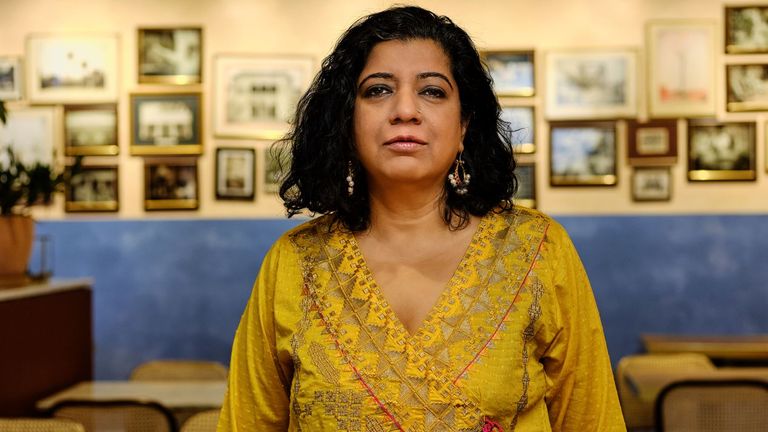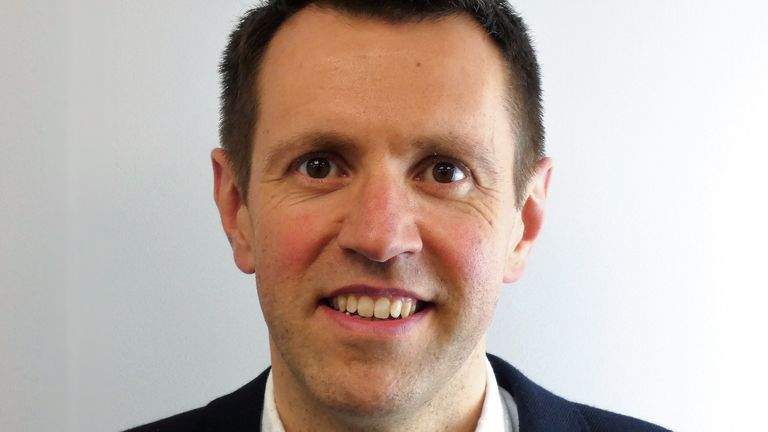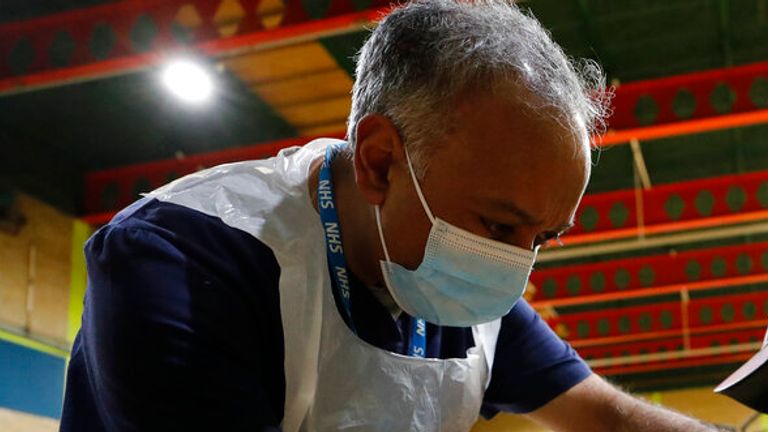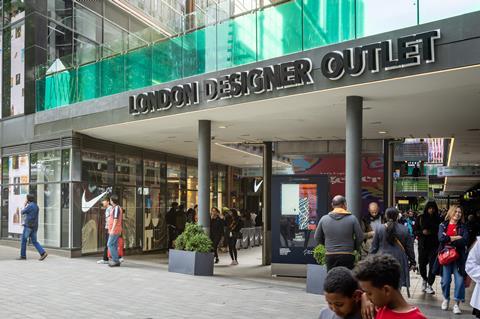Many, including the UK government, had hoped life would go “back to normal” in 2021.
But after the emergence of what some have described as the “nastiest” variant yet, the pandemic will be far from over in the New Year.
Sky News has asked five experts what their predictions are for COVID and 2022 – and here a virologist, restaurant owner, social psychologist, economist and GP give their their views.
The scientist
Professor Andrew Easton, virologist at the University of Warwick
Some elements of Omicron are still not yet clear.
But even if this variant causes less severe disease, if the number of people infected continues to go up as we are seeing now, so too will the numbers going to hospital and dying.
Many people will be severely affected by it, either from getting seriously ill or not being able to work, particularly in places like healthcare – but it will cause problems in various sectors.
In the more immediate term, I think it’s very likely there will be further restrictions in the New Year.
The earlier you impose the restrictions the more impact they are likely to have because they are more likely to break the transmission cycle.
But the delay we’re seeing will likely have the unfortunate consequence of lengthier restrictions afterwards.
Cases will have to peak at some point, but even once they’ve peaked, there will still be a lot of people getting infected.
I don’t think any restrictions imposed will be quite as long as last time – because this time last year we didn’t have vaccines – or boosters.
However, I think it’s very likely the protection offered by boosters is going to be short lived.
We’re in a situation now where getting regular vaccines will be what allows us to go about our normal lives.
We can’t stay locked down forever – it has to end at some point.
But in 2022 people will need the facts to make their own common-sense decision, which requires clear, accurate and unbiased information.
There’s the other question of whether we have to re-tool the vaccines for Omicron.
A good thing about the newer, MRNA vaccines we have is they are much faster to re-target to new variants.
It can be done in 100 days, which compares extremely well to other vaccines like flu, which take six months.
But it’s a careful balance. If we tweak them – will they still protect against Delta? We’re in new territory here, so it has to be a precautionary approach.
It’s also very clear that unless a major step is taken outside our own borders on vaccines, we’re going to see these variants popping up more frequently.
Omicron should be a wake up call. The longer there is a delay in delivering vaccines to impoverished and hard-to-reach areas, the longer we will have to live like this.
The restaurateur
Asma Khan, owner of Darjeeling Express in London’s Covent Garden and star of Netflix show Chef’s Table

We’re starting 2022 the same as we did last year, with the threat of being put back into restrictions with no notice.
January is always hard for us anyway, but again it’s the uncertainty that’s killing us.
In some ways it would be less painful to start the year with another lockdown – instead it’s more of the usual short-termism and soundbites from the government.
And independent restaurateurs are not part of these conversations at all.
The price of everything is going up, so next year I think we’ll see a shift in pricing on menus to reflect the huge jump in costs.
It might deter people from coming out, and in 2022 restaurants might become places people only go on very special occasions.
There’s also complete instability in the supply system.
There’s no one to bring us our produce and drivers are not going to materialise overnight.
We’ve also got huge problems with staff. This new variant will carry on spreading rampantly in the New Year – affecting the age group of our front of house staff – 25 to 35 – the most.
We need support with that. We didn’t manage to recruit a single person through the government’s Kickstart Scheme in 2021.
Restaurants need some back-up – interest-free loans to help us recover – because we’re running on empty.
Business rates and VAT need to come down. My landlord has been very accommodating but rent for most people is absolutely debilitating.
I try to stay positive, but I don’t think it’ll be until summer next year, when you can be outside and it’s the school holidays, that we’ll see the end of this.
School is a huge issue with COVID. Children are bringing back COVID to their families, which is particularly a problem in Asian households where you often get three generations living under one roof.
So I think the school year will need to have ended before people start properly coming out again.
2022 is going to be a time of great challenges for restaurants. And not all of us will pivot out of this situation and survive.
But I do feel optimistic that by the end of 2022 we’ll be in a better place.
The psychologist
Dr Chris Cocking, social psychologist, expert in crowd and emergency behaviour at the University of Brighton

Generally, the public’s behaviour in emergencies is much more resilient than the authorities give them credit for. But there’s a caveat to that.
Compliance with restrictions the first time around was so high because there were good levels of trust and a shared sense of identity – an idea of ‘we’re all in this together’.
We have had a massive erosion of that trust since then.
First it was Dominic Cummings and Barnard Castle, then it was party-gate and sleaze allegations.
If people think ‘it’s one rule for us and another rule for them’, compliance could suffer as this shared sense of identity could diminish.
Another small caveat is that not everyone will act the same.
Those who are already ambivalent to restrictions and vaccines may think ‘I’m not going to bother’ if those in authority aren’t following the restrictions themselves.
But there are other people who are already being cautious. And seeing the way politicians are behaving could make those people more determined to follow the rules, because that will reinforce their identity as ‘someone who does the right thing’, despite those in authority not doing so.
They might also look at public health officials like the chief medical officer and think ‘I’m not like Boris Johnson, but I am like Chris Whitty’ and they will continue to identify with and so listen to him for that reason.
So that erosion of trust in authority might not be total.
With Omicron in 2022 I think we will see some degree of resignation in people to any new restrictions.
We saw it with the Blitz during the Second World War. People become habituated to adversity and can also adopt a black humour approach.
Overall in terms of mental health across the population, so far the pandemic hasn’t seemed to cause a general increase in mental health issues across the population as a whole.
But it has exacerbated existing structural inequalities, so people who were already vulnerable will suffer more and will need targeted support.
Middle class people may find it much easier to work from home and self-isolate, whereas for bus drivers, cleaners and people who work in a factory that is much, much harder.
There is also the enormous problem with NHS and social care staff being at breaking point.
And if schools close again and the financial support for computers and learning from home isn’t there, children are going to miss out on more education and social interaction.
But assuming the Omicron wave passes, there isn’t another scarier variant, and vaccination continues at the pace it is, I can see any new restrictions being eased in the spring – and possibly a return to more positivity as the weather gets better.
The economist
James Smith, research director at the Resolution Foundation, previously held a range of roles at the Bank of England and civil service

With Omicron being so highly transmissible, it’s very hard to see how new restrictions won’t be put in place next year.
But whether we go into lockdown or not, people are already being cautious, so it’s going to hit the economy regardless. We can see it in the eating out data, in retail and people’s mobility levels.
The transmissibility of Omicron means this wave is likely to be shorter than the Delta one.
But the Chancellor still needs to return to support mode because Omicron will be hitting at the same time as the cost-of-living crunch.
There’s going to be a reduction in demand, and the sheer scale of the Omicron wave means millions isolating and therefore a reduction in supply too.
The furlough scheme has been incredibly powerful in stopping unemployment. We know these policies work.
But the early strategy of blanket loans risks quite a lot of fraud and money being poorly targeted.
A return to local-authority administered grants would mean support for businesses in the worst-hit sectors and locations.
The hospitality industry is priority number one, but we’re still worried about travel – airlines and transport providers – who will see an incredibly sharp fall in numbers from Omicron and will need more support next year.
It looks like the ways people in the UK are going to be poorer in 2022 is through higher taxes and higher inflation.
The recent rise in interest rates won’t have a big impact at all, as they only affect around 7% of mortgages.
But the big thing for families will be around energy.
We’re expecting the biggest rise in the price cap we’ve seen yet – to £400 or more – and there are big questions around how sustainable that will be for households.
Energy prices hit lower income families hardest because people in that group spend a greater proportion of their income on energy bills.
Beyond that future waves from future variants are a worry.
But the Bank of England is counting on the economy being able to sustain activity through restrictions.
If that is the case we would see the economy come back to life relatively quickly after any lockdown, and start to see a recovery around Q2 of 2022.
But it depends on how ambitious policy makers are prepared to be and how aggressively they want to push for that recovery.
The GP
Dr Anil Mehta, GP and primary care lead in Barking, Havering and Redbridge, northeast London

The situation we’re in with COVID at the moment is very challenging.
But if in the next three or four months we can boost enough people, we will have a chance of reining in the number of infections and burden on the NHS.
And closer to the spring I think things will be better.
The first few weeks of 2022 are going to be critical in doing that.
So far the queues for boosters have been very promising. People do want to do the right thing and that’s been remarkably humbling for us.
The difficulty we might face is supply of vaccine.
If the rollout accelerates as it has been doing, we need supply to keep up with demand.
There’s plenty of vaccine and plenty of vaccinators but getting vaccines to the sites – and having enough drivers to get them there – might cause some degree of slowing down.
I also think we need to vaccinate our younger cohorts.
COVID is rife in schools and colleges, so I think that’s the way the science is pointing and it seems like the inevitable next step.
As a GP, I see chronic disease like diabetes, cancer and COPD, every day. We’re also seeing a resurgence of flu.
My concern is that we don’t put that too far away from us so that the complications from those conditions don’t pile up and that be the next pandemic.
We need to send a message that General Practice is open and there if you need it.
But we still have an immediate problem with our workforce – and that will continue to be the case.
We didn’t start from a great place, even before COVID, as the numbers of doctors and nurses for our population are well below European levels.
As such it will only take a slight reduction to have a real impact on patient care.
No part of the system is immune from staff shortages.
It could mean the closure of a whole unit, longer waiting times in A&E and the cancellation of elective procedures.
https://news.sky.com/story/covid-19-what-will-the-pandemic-mean-for-the-uk-in-2022-experts-give-their-predictions-12501196




